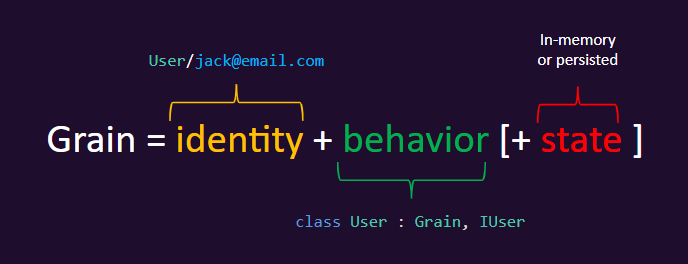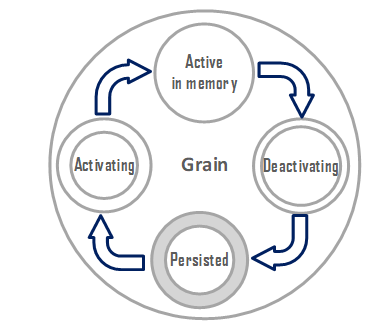Learn Orleans 02 - Hello World
基础概念

Orleans的核心概念见上图。
--https://www.cnblogs.com/sheng-jie/p/11223848.html
--https://github.com/sheng-jie/Samples.AllInOne/tree/dev/Orleans
Grain就是Actor,是执行的最小单位。Silo是Orleans的运行时,用于托管Grains。一组Silo能够形成分布式集群,并能够进行容错处理。
--https://dotnet.github.io/orleans/Documentation/index.html
Grain = 身份 + 行为 + 状态(可选)

Grain的生命周期由运行时管理,状态变化如下图:

Hello World
https://dotnet.github.io/orleans/Documentation/tutorials_and_samples/tutorial_1.html
Orleans Hello World由四个项目组成:
- grain interfaces
- grain classes
- Silo Host
- Console Client
首先创建项目结构
dotnet new console -n Silo
dotnet new console -n Client
dotnet new classlib -n GrainInterfaces
dotnet new classlib -n Grains
dotnet new sln -n OrleansHelloWorld
dotnet sln add Silo Client GrainInterfaces Grains

设置这四个项目的依赖关系如上图所示。
随后添加所需的nuget包
#silo
dotnet add package Microsoft.Orleans.Server
dotnet add package Microsoft.Extensions.Logging.Console
#client
dotnet add package Microsoft.Orleans.Client
dotnet add package Microsoft.Extensions.Logging.Console
#GrainInterfaces
dotnet add package Microsoft.Orleans.Core.Abstractions
dotnet add package Microsoft.Orleans.CodeGenerator.MSBuild
#Grains
dotnet add package Microsoft.Orleans.Core.Abstractions
dotnet add package Microsoft.Orleans.CodeGenerator.MSBuild
dotnet add package Microsoft.Extensions.Logging.Abstractions
GrainInterface - IHello.cs
using System.Threading.Tasks;
namespace OrleansBasics
{
public interface IHello : Orleans.IGrainWithIntegerKey
{
Task<string> SayHello(string greeting);
}
}
Grain - HelloGrain.cs
using Microsoft.Extensions.Logging;
using System.Threading.Tasks;
namespace OrleansBasics
{
public class HelloGrain : Orleans.Grain, IHello
{
private readonly ILogger logger;
public HelloGrain(ILogger<HelloGrain> logger)
{
this.logger = logger;
}
Task<string> IHello.SayHello(string greeting)
{
logger.LogInformation($"\n SayHello message received: greeting = '{greeting}'");
return Task.FromResult($"\n Client said: '{greeting}', so HelloGrain says: Hello!");
}
}
}
Silo – Program.cs
using System;
using System.Threading.Tasks;
using Microsoft.Extensions.Logging;
using Orleans;
using Orleans.Configuration;
using Orleans.Hosting;
namespace OrleansBasics
{
public class Program
{
public static int Main(string[] args)
{
return RunMainAsync().Result;
}
private static async Task<int> RunMainAsync()
{
try
{
var host = await StartSilo();
Console.WriteLine("\n\n Press Enter to terminate...\n\n");
Console.ReadLine();
await host.StopAsync();
return 0;
}
catch (Exception ex)
{
Console.WriteLine(ex);
return 1;
}
}
private static async Task<ISiloHost> StartSilo()
{
// define the cluster configuration
var builder = new SiloHostBuilder()
.UseLocalhostClustering()
.Configure<ClusterOptions>(options =>
{
options.ClusterId = "dev";
options.ServiceId = "OrleansBasics";
})
.ConfigureApplicationParts(parts => parts.AddApplicationPart(typeof(HelloGrain).Assembly).WithReferences())
.ConfigureLogging(logging => logging.AddConsole());
var host = builder.Build();
await host.StartAsync();
return host;
}
}
}
Client – Program.cs
using Microsoft.Extensions.Logging;
using Orleans;
using Orleans.Configuration;
using System;
using System.Threading.Tasks;
namespace OrleansBasics
{
public class Program
{
static int Main(string[] args)
{
return RunMainAsync().Result;
}
private static async Task<int> RunMainAsync()
{
try
{
using (var client = await ConnectClient())
{
await DoClientWork(client);
Console.ReadKey();
}
return 0;
}
catch (Exception e)
{
Console.WriteLine($"\nException while trying to run client: {e.Message}");
Console.WriteLine("Make sure the silo the client is trying to connect to is running.");
Console.WriteLine("\nPress any key to exit.");
Console.ReadKey();
return 1;
}
}
private static async Task<IClusterClient> ConnectClient()
{
IClusterClient client;
client = new ClientBuilder()
.UseLocalhostClustering()
.Configure<ClusterOptions>(options =>
{
options.ClusterId = "dev";
options.ServiceId = "OrleansBasics";
})
.ConfigureLogging(logging => logging.AddConsole())
.Build();
await client.Connect();
Console.WriteLine("Client successfully connected to silo host \n");
return client;
}
private static async Task DoClientWork(IClusterClient client)
{
// example of calling grains from the initialized client
var friend = client.GetGrain<IHello>(0);
var response = await friend.SayHello("Good morning, HelloGrain!");
Console.WriteLine("\n\n{0}\n\n", response);
}
}
}
Run起来:
先启动Silo再启动Client,结果如下:

总结
这个例子其实就是简单的RPC调用,通过引用相同的接口组件,Client能够直接访问Server,它更贴近面向对象的编程风格。下一篇我们来讲解Actor的无锁特性。
本文采用 知识共享署名 4.0 国际许可协议 进行许可



